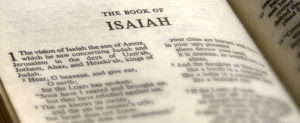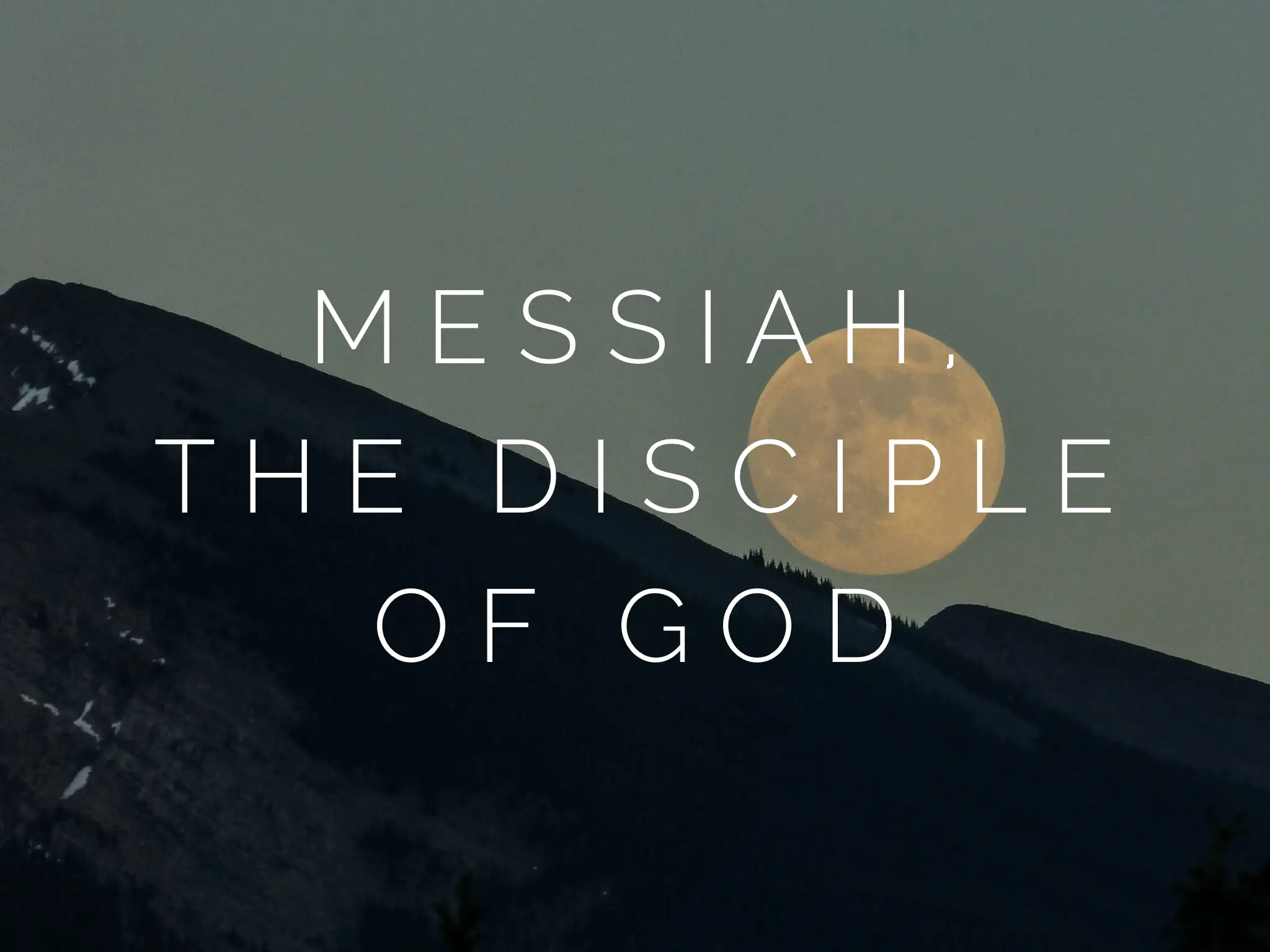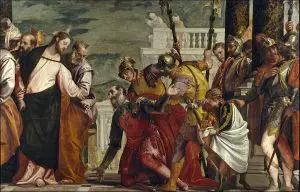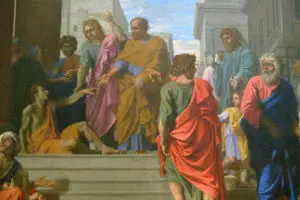Isaiah is quoted in the New Testament more than any other major prophet and more than all of the minor prophets combined. He is further distinguished as being the prophet who foretold more about the coming Messiah than any other Biblical author. Who then did this trusted prophet understand the Messiah to be? This question can be answered by examining Isaiah’s four prophetic messages known as the Servant Songs, in which the coming Messiah is referred to as the Servant of God (Yahweh).[1] In this post, we will look at the third Servant Song to discover how its Christology differs from that of modern orthodoxy.
The Messiah is a Disciple of God
In the opening phrases of this prophetic passage, the servant of God[2] describes himself as a disciple of Yahweh:
Isaiah 50:4 (NASB) The Lord GOD (Yahweh) has given Me the tongue of disciples, That I may know how to sustain the weary one with a word. He awakens Me morning by morning, He awakens My ear to listen as a disciple.
To be given the tongue of a disciple means that the servant of God, whom we know to be Jesus,[3] received instruction from God. Not a one time instruction, but an ongoing discipleship as the phrase morning by morning indicates. While Isaiah 49 reveals that God made His servant’s mouth a sharp sword,[4] i.e., the divine words he speaks can pierce men’s hearts,[5] here we read that God taught His servant how to sustain the weary with a divine word. Thus, the Messiah’s words both wound and heal.

Modern orthodoxy would have us believe that Jesus was able to speak life-giving words because he is God. More specifically, because he preexisted in heaven as God the Word. But Jesus repeatedly stated that the words he spoke were not his own:
John 7:16-17 (NASB) So Jesus answered them and said, “My teaching is not Mine, but His who sent Me. 17 “If anyone is willing to do His will, he will know of the teaching, whether it is of God or whether I speak from Myself. (emphasis added)
John 8:26 (NASB) “I have many things to speak and to judge concerning you, but He who sent Me is true; and the things which I heard from Him, these I speak to the world.” (emphasis added)
John 8:27-28 (NASB) They did not realize that He had been speaking to them about the Father. 28 So Jesus said, “When you lift up the Son of Man, then you will know that I am He, and I do nothing on My own initiative, but I speak these things as the Father taught Me. (emphasis added)
John 8:40 (NASB) [Jesus said,] “But as it is, you are seeking to kill Me, a man who has told you the truth, which I heard from God; this Abraham did not do. (emphasis added)
John 12:48-50 (NASB) “He who rejects Me and does not receive My sayings, has one who judges him; the word I spoke is what will judge him at the last day. 49 “For I did not speak on My own initiative, but the Father Himself who sent Me has given Me a commandment as to what to say and what to speak. 50 “I know that His commandment is eternal life; therefore the things I speak, I speak just as the Father has told Me.”
John 14:10 (NASB) “Do you not believe that I am in the Father, and the Father is in Me? The words that I say to you I do not speak on My own initiative, but the Father abiding in Me does His works. (emphasis added)
John 14:24 (NASB) “He who does not love Me does not keep My words; and the word which you hear is not Mine, but the Father’s who sent Me. (emphasis added)
John 15:15 (NASB) “No longer do I call you slaves, for the slave does not know what his master is doing; but I have called you friends, for all things that I have heard from My Father I have made known to you. (emphasis added)
John 17:1 and 6 and 8 (NASB) Jesus spoke these things; and lifting up His eyes to heaven, He said, “Father…6 “I have manifested Your name to the men whom You gave Me out of the world; they were Yours and You gave them to Me, and they have kept Your word…8 for the words which You gave Me I have given to them… (emphasis added)
John 17:14 (NASB) “I have given them Your word; and the world has hated them, because they are not of the world, even as I am not of the world. (emphasis added)
Indeed, God taught Jesus what to say. If Jesus is God, as some claim, it makes no sense to say that God received instruction. Does the Word of God need to be given words to speak? Does God need to be discipled as to how to sustain, strengthen, and refresh His people? Of course not. If, however, Jesus is God’s human servant as Isaiah portrays him, it is quite reasonable to say that he needed to be instructed by God and that he needed to have his ears awakened by God to receive that instruction.
Isaiah 50:4 (NASB) The Lord GOD has given Me the tongue of disciples, That I may know how to sustain the weary one with a word. He awakens Me morning by morning, He awakens My ear to listen as a disciple. (emphasis added)
The Messiah is an Obedient Disciple
In sharp contrast to the rebellious Israelites who “have not heard” and whose ears “had not been open,”[6] God opened the ears of His Servant:[7]
Isaiah 50:5 (NASB) The Lord GOD has opened My ear; And I was not disobedient nor did I turn back. (emphasis added)
Upon hearing what would be required of him,[8] God’s servant chose not to turn his back on God in disobedience as other prophets, like Jonah before him, had done.[9] Instead, he would obey.[10]
If Jesus is God, would we expect anything less than complete obedience? Can God disobey? Can God sin? If not, then verse 5 is meaningless. But if Jesus is the human Messiah, capable of disobedience, capable of rejecting God’s will, then it is significant that he chose to remain obedient.
The Extent of Messiah’s Obedience
Messiah’s obedience becomes even more remarkable when Isaiah’s readers learn the extent to which the anointed king will obey his God:
Isaiah 50:6 (NASB) I gave My back to those who strike Me, And My cheeks to those who pluck out the beard; I did not cover My face from humiliation and spitting.
This verse is a prelude to Isaiah’s fourth Servant Song, which chronicles the Messiah’s suffering in greater detail.[11] But in chapter 50, we learn that the Messiah will experience excruciating flogging, be spat upon, and have his facial hair plucked out, acts that were designed to bring pain and shame upon the recipient.[12]
Because Jesus was obedient to God’s plan and endured much suffering, he is able to speak a word in season to those who also suffer. It is this kind of subjection to God’s will that encourages us to remain faithful when we are tempted to abandon God:
Hebrews 2:18 (NASB) For since He Himself was tempted in that which He has suffered, He is able to come to the aid of those who are tempted.
A human Messiah, who is truly like us in all ways,[13] offers us greater hope and encouragement in our suffering and temptations than a God-Man who cannot possibly disobey and therefore cannot be genuinely tempted.[14]
How Did Yahweh’s Servant Endure Persecution?
How was Jesus able to endure such persecution and suffering? Isaiah records that it is because he received help from God:
Isaiah 50:7-9 (NASB) For the Lord GOD helps Me, Therefore, I am not disgraced; Therefore, I have set My face like flint, And I know that I will not be ashamed. 8 He who vindicates Me is near; Who will contend with Me? Let us stand up to each other; Who has a case against Me? Let him draw near to Me. 9 Behold, the Lord GOD helps Me; Who is he who condemns Me? Behold, they will all wear out like a garment; The moth will eat them. (emphasis added)
Twice Messiah says that it is the Lord God who helps him. Does God need God to help him endure? Does God need to be strengthened? Assuredly not. But the decidedly human Messiah of Isaiah’s Servant Song, like any of us, needs the strength of his God to endure persecution and hardship.
In addition, the Messiah is trusting God to vindicate him and to contend with those who bring a charge against him. If Jesus is God, he would vindicate himself. As God, he would be supremely able to contend for his own cause. But he does neither. Instead, as the human Messiah, he must trust that God will vindicate and contend for His servant.
He Sustains the Weary One With A Word
What is the life-giving word that God taught the Messiah to speak to those who are weary? What encouragement does he offer to those who find themselves in the midst of darkness, who cannot see the hand of God, and who may be tempted to doubt His nearness?
Isaiah 50:10 (NASB) Who is among you that fears the LORD, That obeys the voice of His servant, That walks in darkness and has no light? Let him trust in the name of the LORD and rely on his God. (emphasis added)
The servant of God exhorts us to trust in the name of the LORD (Yahweh) and to rely upon Him. In other words, the Messiah instructs us to do what he has done: to set our face like flint and be resolute in our trust of God in the midst of our suffering. For this reason, the apostle Peter reminds us to follow Jesus’ example:
1 Peter 2:21 (NASB) For you have been called for this purpose, since Christ also suffered for you, leaving you an example for you to follow in His steps
It Is All God’s Doing
Unlike modern orthodoxy which purports that Jesus ordained and orchestrated his own ministry, the Messiah of Isaiah 50 gives God all of the credit for his mission. The Messiah says it is God who:
- has given him the tongue of disciples
- awakens him morning by morning to listen as a disciple
- has opened his ear
- helps him
- preserves him from disgrace and shame
- vindicates him
- is near to him
Does God need to be instructed by God? Helped by God? Preserved by God? Vindicated by God? Undoubtedly, no. But a human Messiah most certainly does. And it is this human Messiah, the disciple of God, that in turn teaches us to trust in God in the midst of suffering:
Luke 23:46 (NASB) And Jesus, crying out with a loud voice, said, “Father, INTO YOUR HANDS I COMMIT MY SPIRIT.” Having said this, He breathed His last.
[1] Isaiah 42:1-9; 49:1-13; 50:4-11; 52:13 through 53:12.
[3] Jesus is the Christ/Messiah: John 1:41; 4:25-26. Jesus is the servant of God: Acts 3:13, 26; 4:26-30.
[5] Hebrews 4:12; Revelation 1:16; 19:15; Ephesians 6:17.
[7] Some suggest that the phrase “opened my ear” may allude to the practice spoken of in Exodus 21:2-6 and Deuteronomy 15:12-17, where a freed servant willfully chooses to remain with his master. In which case, the master is directed to take an awl and pierce the servant’s ear to identify him as a “forever” servant. The piercing awl is said to “open the ear” of the servant (Psalm 40:6).
[8] John 18:4. See also John 6:64; 13:1 and 11.
[11] Isaiah 52:13 through 53:12.
[12] See also Nehemiah 13:25.






Wow your stuff is so good!!
Thanks for checking out the website! I appreciate your encouragement!
Blessings,
OGW